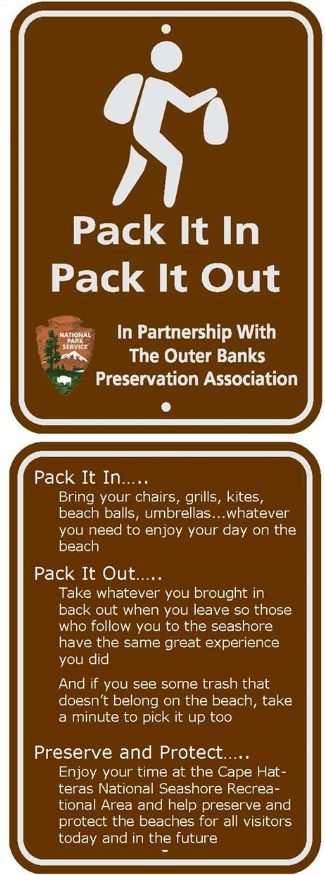The OBPA has maintained low membership fees for years. However, the time has come for us to raise our rates.
Effective for 2011, the price of annual renewals will increase to $20. New memberships will cost $35 for the first year, which continues to include the cost of an OBPA license plate and the OBPA decal. Lifetime memberships will remain at $250.
Your are probably already aware that the OBPA team is 100% volunteers. There are no perks or payment of any kind to the individuals who work constantly for beach access in between work and family obligations. All membership fees, donations and proceeds made from fundraisers are used strictly for maintaining access to the beaches of the Outer Banks with most of these funds going to our legal team. 2011 and 2012 are shaping up to be very busy years due to the pending implementation of highly restrictive access rules and regulations.
These increases will be reflected on the notices mailed monthly when membership fees become due, as well as on the membership signup page on the website.
Thank-you for your continued support of the OBPA.
WASHINGTON, D.C. – U.S. Congressman Walter B. Jones (R-NC), Senator Kay Hagan (D-NC) and Senator Richard Burr (R-NC) are pushing for as much public access as possible on Hatteras beaches. The NC delegation members yesterday sent a letter to Department of Interior Secretary Ken Salazar and OMB Director Jacob Lew asking that the proposed off-road vehicle management plan for Cape Hatteras National Seashore provide maximum public beach access. National Park Service officials have prepared a draft rule, which is currently under review prior to being released for public comment.
“The public access restrictions in this proposal are unreasonably excessive and far more than what is necessary for adequate resource protection,” said Jones. “This is a jobs issue. If the Administration is serious about job creation, it will revise this proposal.”
“Beach access is critical to the Dare County economy, and that is why I am working with Representative Jones and Senator Burr to make sure federal regulations are not overly restrictive for the local community,” Hagan said. “The Hatteras community has experienced three summers with many beaches closed, and some local businesses may not survive another. I will continue working with the administration, my colleagues in Congress and all relevant stakeholders to balance appropriate beach access with important environmental protections.”
Congressman Jones has been a longtime outspoken advocate for responsible motorized public access. In January of 2009, Jones introduced H.R. 718, legislation that would reinstate the Interim Management Strategy governing off-road vehicle use on Cape Hatteras National Seashore (CHNS).
In January, Hagan held “Conversations with Kay” in Dare County and talked with Outer Banks residents about their concerns with restrictive public access to North Carolina beaches. Also, Hagan has cosponsored the Preserving Public Access to Cape Hatteras Beaches Act, which would reinstate the Interim Management Plan for off-road vehicles at the Seashore.
To see the full text of the letter to the DOI and OMB click here.
At Hagan's urging, Bonner Bridge replacement will move forward
WASHINGTON, D.C. - At the urging of United States Senator Kay R. Hagan (D-NC) and other members of the North Carolina delegation, the U.S. Departments of Interior and Transportation have endorsed the replacement of the deteriorating Bonner Bridge, which until today has been caught up in government red tape. Since coming to the Senate, Hagan has been seeking a solution that will allow the permitting process for the bridge to proceed without additional extensive and time-consuming studies. She has discussed the issue repeatedly with Interior Secretary Ken Salazar, and in September, Secretary Salazar sent Assistant Secretary for Fish and Wildlife and Parks Tom Strickland to Manteo to see firsthand the bridge's fragile state.
"Today's decision is a critical step toward beginning construction on the replacement of Bonner Bridge, ensuring that safe travel to and from Hatteras Island will be a reality," Hagan said. "One of my key priorities has been to ensure the bridge replacement project could move forward, and today is a real victory for the Hatteras Island community. I am very appreciative that Secretary Salazar and Victor Mendez, Administrator of the Federal Highway Administration, listened to my concerns regarding the critical importance of replacing the bridge."
This past weekend, Secretary Salazar told Senator Hagan about the department's decision to remove roadblocks to the bridge's replacement.
Dating to her time in the General Assembly, Senator Hagan has been closely monitoring this issue along with state Senator Marc Basnight of Dare County. On November 5, Hagan toured Oregon Inlet by boat to examine the state of Bonner Bridge, and met with Dare County Commissioners Warren Judge and Allen Burrus, the U.S. Army Corps of Engineers, and community leaders to discuss the project. Pictures are available here:
http://hagan.senate.gov/files/110510_BonnerBridge_1.jpg
http://hagan.senate.gov/files/110510_BonnerBridge_2.jpg
http://hagan.senate.gov/files/110510_BonnerBridge_3.jpg
The Bonner Bridge links Bodie Island to Hatteras Island and is the vital artery connecting Hatteras Island to the mainland. The bridge was built in 1963 with an estimated lifespan of 30 years. It is now 17 years past the projected retirement date of 1993.
11/26/2010 -
The following letter to the Virginian Pilot editor was published this week in the newpaper's online edition. It was written by Jeff "Wheat" Golding, OBPA board member, in response to an earlier editorial supporting the FEIS. That editorial can be read at
http://hamptonroads.com/2010/11/good-compromise-hatteras-driving
Reply:
A good compromise on Hatteras driving, I should say not!
The fight for access to Cape Hatteras National Seashore Recreational Area began long before the now infamous presidential executive order 11644 signed by Nixon in 1972. In fact, the Park Service originally intended that Hatteras and Ocracoke be set aside as primitive wilderness, in complete conflict with the 1937 legislation establishing the Seashore. The Park Service’s new proposed plan is also in direct conflict with that legislation and a healthy dose of other federal statutes designed to guide NPS and other federal agencies in their management decisions.
I received my copy of the FEIS (proposed rule) Thursday the 18th of this month. The scales at the post office put this two volume, 1000 plus page document, at 8 pounds 12 ounces. And in spite of my hard earned knowledge of the subjects at hand, I have only just begun to digest this federal work. I have seen enough already to know that what has been presented in this editorial is flawed and often not fact based.
The new rule does not bring predictability to the Seashore except what areas will be permanently closed to both pedestrian and ORV use. The remaining areas will still be subjected to confusing seasonal and nesting closures as they have for the last three years. The proposed new parking areas will not assist anyone in accessing the remote portions of the islands and in fact will eliminate access to significant portions of the seashore to mobility impaired persons such as me. If you study the FEIS you will see this. And if you look beyond the published FEIS, you will also see that the reported economic impact of the Consent Decree, somewhat mild in comparison to the proposed rule, has been white-washed by NPS in their thinly veiled attempt at “putting lipstick on a pig”.
Mr. Luzzatto, When I called and spoke to you yesterday and received your blessing to extend beyond the 750 character limit, I neglected to mention Carter’s E.O. 11989 (1977) and the Park Services’ reliance and use of this order in order to justify these immense, proposed closures. This E.O. requires that NPS determine that “considerable adverse effects” either will be caused or are being caused by ORV’s before an area is closed to ORV use. To date, NPS, neither USFWS nor the various environmental groups have been able to demonstrate anything even remotely approaching “considerable adverse effects” as a result of vehicular access to the Seashore. Instead we are confronted with hundreds of pages of speculation, out of date studies, USGS protocols that were “peer reviewed” by the authors, and it gets worse. One study within the FEIS concerns bird behavior in South Africa, perhaps just a short ferry ride from Ocracoke.
A compromise this FEIS is not. Instead it is a significant derogation of the congressionally mandated mission of this Seashore that will negatively affect the lives of tens of thousands of people from all over this nation, many of whom have visited here for generations, as well as those of us that live here. Without the ability to show “considerable adverse effects”, NPS proposes to change the entire nature of this seashore and our environment. This is not a compromise; this is a tragedy unfolding before our eyes.
I encourage Mr. Luzzatto to come and visit Hatteras Island to see and hear firsthand what this proposed rule will mean to the residents and visitors to this island.
Wheat
HAGAN COMMENTS ON FINAL ENVIRONMENTAL IMPACT STATEMENT FOR CAPE HATTERAS NATIONAL SEASHORE
National Park Service report covers off-road vehicle usage on the Seashore
Monday, November 15, 2010 WASHINGTON, D.C. -
U.S. Senator Kay R. Hagan today commented on the Final Environmental Impact Statement issued by the National Park Service on off-road vehicle usage at Cape Hatteras National Seashore. Last August, Hagan cosponsored the Preserving Public Access to Cape Hatteras Beaches Act, which would reinstate the Interim Management Plan for off-road vehicles at the Seashore. This plan allows for expanded beach access while balancing important environmental concerns. "Beach access is critical to the Dare County economy, and this report overly restricts access to the Hatteras beaches. And it does not appear to reflect the input of local residents and businesses. The Hatteras community has now experienced three summers with many of the most popular beaches closed, and I am very concerned that some local businesses may not survive another. "I co-sponsored legislation that would resolve this issue by reinstating the Interim Management Plan. It appropriately balances environmental concerns with beach access. I will continue working with my colleagues and all relevant stakeholders to provide beach access and protect the environment."
Contact Senator Hagan and let her know how you feel about access at Cape Hatteras.....use the link below: http://hagan.senate.got/contact/


